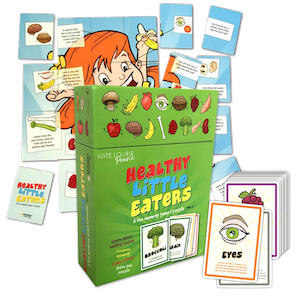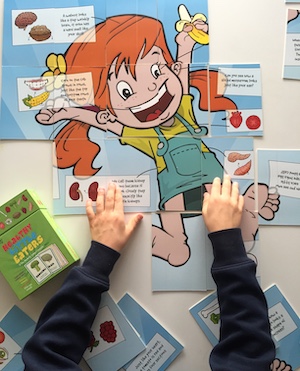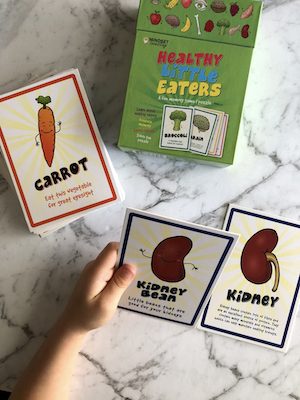How your dieting mindset affects your child’s eating behaviour
Yo-yo dieting is common among parents, particularly mums. But have you stopped to think about how your dieting mindset and weight loss mission is affecting your child’s eating behaviour?
Yo-yo dieting is so common, particularly amongst new mums as they try to get back to their pre-baby weight and figure.
And the pressure is real!
You only have to look at magazine covers and online articles to see celebrities “bouncing back” 24 hours after they’ve given birth or looking even fitter a few months later as they discover the strength of their post-baby body.
But what effect is your dieting mindset and focus on weight loss having on your child’s eating behaviour?
you influence your child’s eating behaviour
As a parent, you have a direct influence on what your child eats and their food preferences. When our children are young, we have a certain level of control over our child’s diet. Outside influences such as peers, school and media are relatively minimal at this time.
Children are more likely to make healthy food choices if they are modelled. They’re also more likely to try new foods if they observe their parents trying them.
But what if you have an unhealthy relationship with food?
You are your child’s greatest role model. If you have an unhealthy relationship with food, your child is more likely to follow suit.
Research has found, girls are more likely to diet if the mother did so.
Children are commonly being taught from a young age to look at food as either being “good” or “bad”. This is due to our tendency as adults to vilify food. As a result, children feel shame when they eat a “bad” food which can lead to unhealthy eating habits such as binge eating.
Your own dieting practices and prejudices about your weight can set your child up for a lifetime of dieting.
A rise in child dieting and disordered eating
While there is a rise in childhood obesity, there is also a rise in children eating disorders.
More than half of Australian primary school-age children want to lose weight with children as young as 8 yrs. old dissatisfied with their body size.
Worryingly, up to 80% of US 10-year-old girls have already been on a diet.
It more and more common for teenagers to restrict their food intake by skipping meals and reducing their portion sizes. Research suggests most dieting teens had begun focusing on weight loss when they were about 10 years old.
Those adolescent girls who diet (even moderately), are five times more likely to develop disordered eating than those who didn’t diet at all. And those adolescents who severely diet are 16 times more likely to develop an eating disorder.
And while it’s more common for girls to suffer from an eating disorder, about 25% of children affected by eating disorders are boys.
Dieting in childhood leads to serious problems
Dieting in childhood can be very problematic leading to both physical and emotional issues. Some of the common concerns about dieting include:
Restrictive caloric intake can stunt the child’s growth and development;
Reduce caloric intake can delay or temporarily stop a girl’s menstruation;
Dieting can cause macro and micronutrient deficiencies leading to developmental and cognitive delays;
A nutrient-poor diet can lead to low energy, tooth decay and changes in bowel function;
Low body weight can cause a weakened immunity;
Dieting can lead to adulthood overweight or obesity;
Restrictive food intake can cause low self-esteem and depression;
Early dieting can foster fussy, overeating and secret eating behaviour;
Early dieting can promote body image issues and eating disorders.
How you can help support healthy eating behaviours in your child
As a parent, you can positively influence your child’s eating behaviours both directly and indirectly by doing the following:
Be a role model and adopt a healthy, nutritious diet featuring a wide variety of fresh, whole foods;
Avoid labelling foods “good” or “bad”;
Limit body shaming yourself or others;
Shift the emphasis from weight to health;
Eat together as a family;
Remove the pressure from the dining table;
Avoid rewarding children with food;
Teach your children about the benefits of healthy foods.
Make healthy eating fun for the whole family!
Healthy Little Eaters Game designed to educate your child about the benefits of fruit and vegetables.
Through matching games, memory games, quizzes and making a fun puzzle, children will learn the link between fresh wholefoods and body parts. Each fruit or vegetable correlates with a body part.
Get your Health Little Eaters Game here.
References
Australian Institute of Family Studies. (2018). Dieting a weight on teenage minds. Retrieved July 10, 2019, from https://aifs.gov.au/media-releases/dieting-weight-teenage-minds
Berge, J. M., Winkler, M. R., Larson, N., Miller, J., Haynos, A. F., & Neumark-Sztainer, D. (2018). Intergenerational Transmission of Parent Encouragement to Diet From Adolescence Into Adulthood. Pediatrics, 141(4), e20172955. https://doi.org/10.1542/peds.2017-2955
Patton, G. C., Selzer, R., Coffey, C., Carlin, J. B., & Wolfe, R. (1999). Onset of adolescent eating disorders: population based cohort study over 3 years. BMJ (Clinical Research Ed.), 318(7186), 765–8. https://doi.org/10.1136/bmj.318.7186.765
Wardle J et al. (2008). Genetic and environmental determinants of children’s food preferences. Br J Nutr 99:S15–S21.






